Camping in Portugal is a popular topic, and we can’t get enough of it either. Portugal is one of our favorite countries in the world. We’ve already traveled to and through the country six times. It’s ideal for camping, traveling, and surfing. Pleasant temperatures, good waves, and diverse landscapes await you year-round. Relax in the beautiful Algarve, ride a wave on the west coast in the Atlantic, or drive through the charming little villages. Today we’ll tell you everything about camping in Portugal.
- Camping in Portugal
- Wild camping in Portugal
- Best time to camp
- Campsites in Portugal
- Camping in Portugal – Our spots
- Renting a camper in Portugal
- Arriving with your own camper
- Driving in Portugal
- Toll roads in Portugal
- Parking in Portugal
- Filling up and petrol prices
- Shopping and supplies
- Conclusion: Camping in Portugal
- Booking tours in Portugal
Camping in Portugal
Portugal is located in Southern Europe and borders Spain. Every year, more than 17 million tourists flock to this small country. By comparison, Portugal itself has a population of just 10.3 million. But the good news is that most tourists visit the Algarve, Lisbon, and Porto. But Portugal offers so much more. You’ll still find plenty of places without crowds and can fully enjoy your Portugal camping trip.
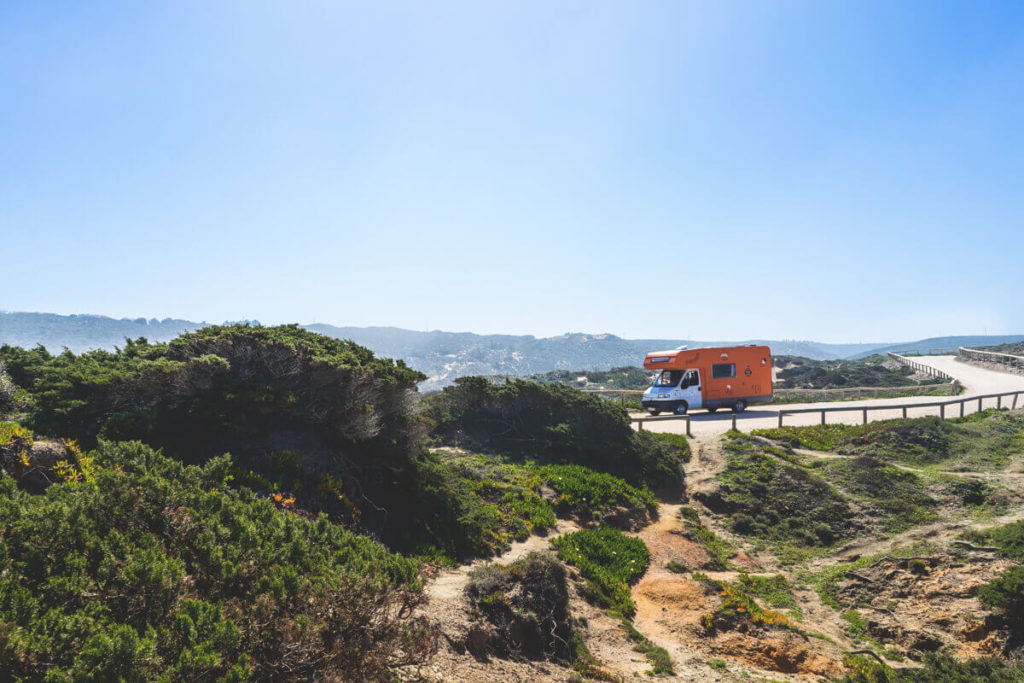
Did you know that the island of Madeira and the Azores archipelago also belong to the country? Hilly landscapes, national parks, beautiful cities, charming villages, breathtaking beaches and bays, and rugged and wild nature await you. From Porto in the north to Lagos in the south, it’s about 580 kilometers. As you can see, the country isn’t even that big. Portugal is therefore ideal for a varied camping holiday.
Wild Camping in Portugal
To clarify an important topic right from the start: Wild camping is generally prohibited in Portugal. If you are caught, you can expect fines of up to €250. This ban is taken very seriously by the Portuguese, especially during peak season and in popular areas. However, the Portuguese are generally very open-minded towards campers. We never had any problems finding an official outdoor spot. “Free camping” is simply tolerated.
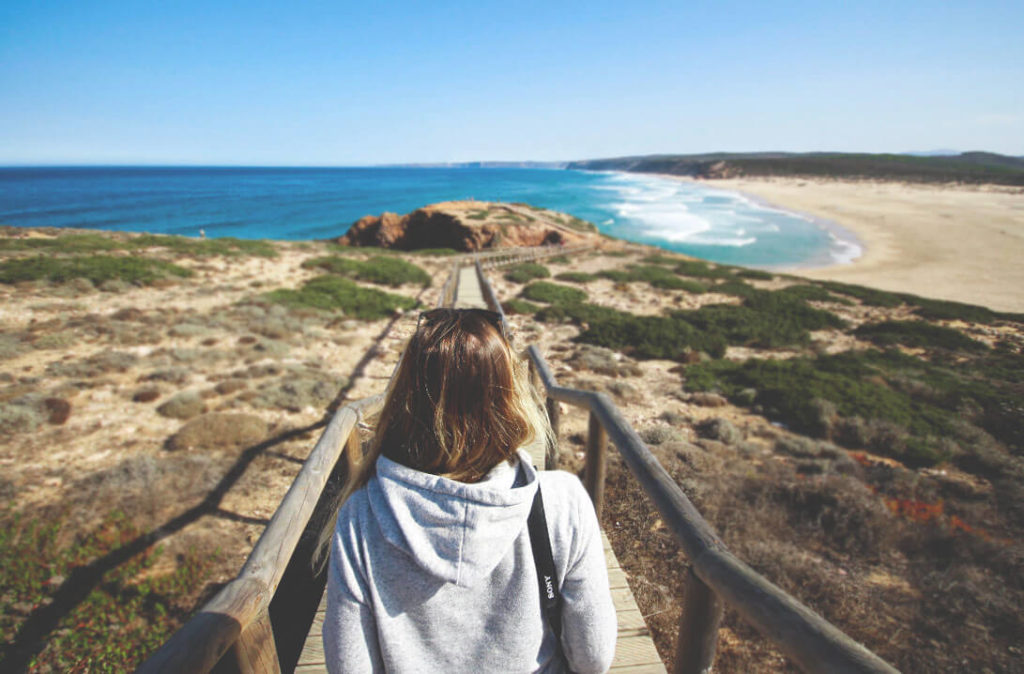
Of course, you’ll always find a nice, cozy spot throughout the country. After an (unobtrusive) overnight stay, you should leave the place as you found it. Take your trash with you and under no circumstances light an open fire. There’s the “iOverlander” app, where you can find established campsites throughout Europe. Nature parks and protected areas are off-limits anyway. If you’re caught there, you’ll also face heavy fines.
It’s also important that you don’t place anything in front of your camper. That means no chairs, no tables, or anything similar. Don’t leave your waste water or toilet contents in nature either. The best time to use Intermarches supermarkets is between May and October. During this time, you can expect plenty of sun, little rain, and pleasantly warm to hot temperatures. Of course, the temperatures also depend on where you are in the country. It’s usually warmer in the south than in the north or directly on the Atlantic coast. We recommend avoiding the high season (July and August), as it’s even busier then, as it usually is.
Campsites in Portugal
You don’t have to wild camp, though, because there are countless pitches and campsites in Portugal. The good thing about these sites is that you can use the sanitary facilities on site. Electricity and water are usually available. Larger sites also offer shops, pools, restaurants, and playgrounds. However, there are significant differences between the individual sites.
Sometimes there are large, comfortable sites, while others are small, natural sites that offer the bare essentials. These are, of course, much more cost-effective. Occasionally, you can even find free sites for campers and RVs. These are usually sites maintained by local communities.
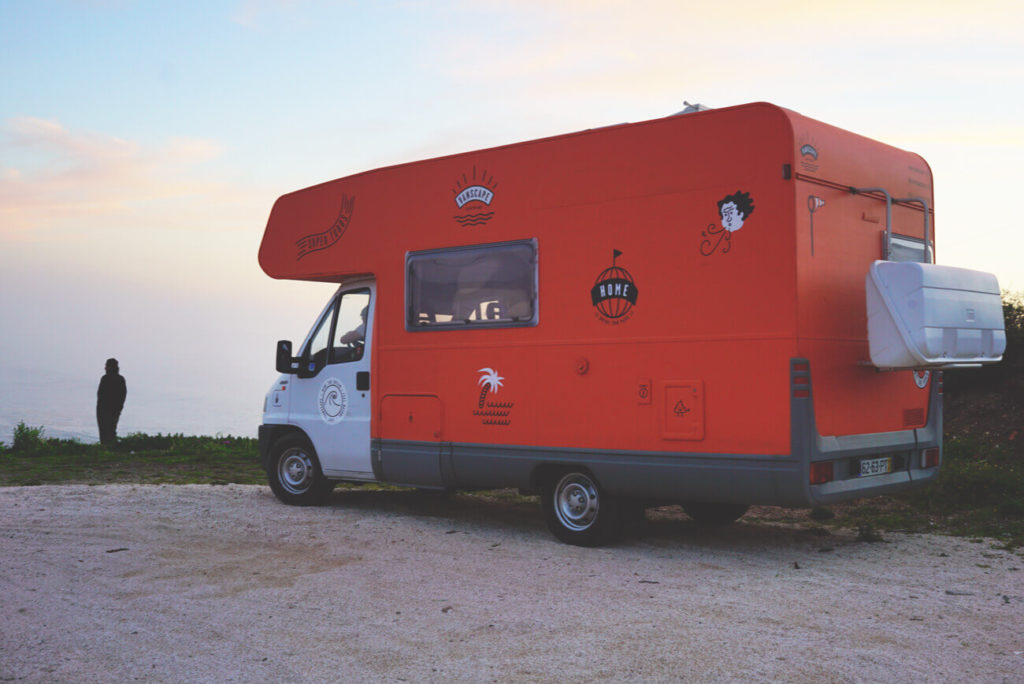
The website www.camping.info lists more than 230 sites across the country. You can also find many sites with all the important information on the Orbitur website. Depending on the season and location, prices at campsites vary greatly. Sometimes it’s €15 per night, sometimes €30 or more for two people with a tent or car. By the way: With the Orbitur Camping Card, you get a 15% discount on all their campsites. The card costs only €15.
Camping in Portugal – Our Spots
We’ve already been to several campsites and spots in Portugal. Below, we’ll share some of our favorite places (especially beaches) in Portugal. It’s best to find a nearby pitch/campsite to spend the night there. Of course, you can also check the situation for free camping on site. As mentioned above, wild camping is generally prohibited, but is tolerated in many areas.
- Beach of Bordeira
- Praia do Amado
- Beaches in and around Sagres
- The small town of Burgau
- Praia do Norte – Nazaré
- Beach of Cordoama
- Praia de Monte Clérigo
- Arrifana in Aljezur
- Praia da Amoreira
- Praia de Odeceixe
- Ribeira d’Ilhas Beach in Ericeira
- Praia De Dunas in Peniche
- Praia da Areia Branca
- Areal Beach Lourinha
- Praia de Rei Cortiço
- Ponta da Piedade
Rent a campervan in Portugal
Camping in Portugal is easy: You fly to Portugal, pick up your pre-rented campervan, and off you go. You’ll find numerous websites where you can find cool campers and caravans. Ranging from simple vans with sleeping facilities to comfortable caravans with a kitchen and bathroom.
On our first trip, we had a small converted van with a sleeping facility, sink, and cooler. On another trip, we had a large Fiat Ducato alcove with space for 5 people, internet, kitchen, shower, toilet, electricity, and much more.
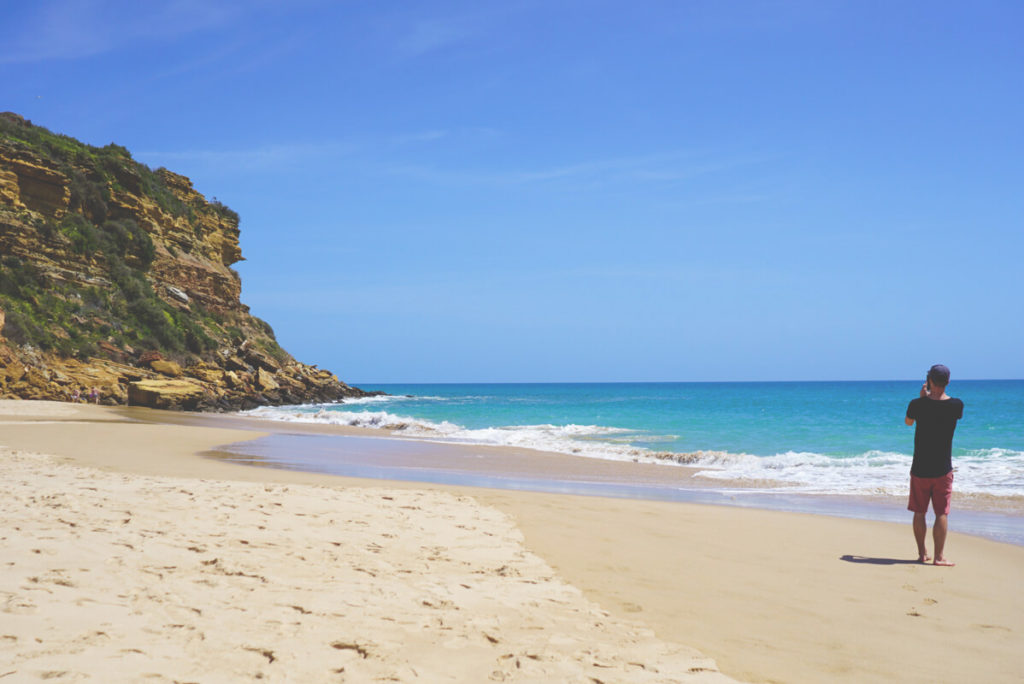
Ultimately, it’s up to you what type of campervan you rent. Depending on the season, you’ll pay €60 per day or even €120 (or even more). Prices are usually cheapest from January to March and highest in the peak months of July and August. On the Campanda website, you’ll find numerous providers and campers. We rented our Fiat Ducato from them for €100 per day. There were four of us, so we were able to split the costs easily.
Pay attention to the insurance coverage and included services. Ask beforehand what’s covered and what’s not. Almost all providers also allow you to book additional services, such as surfboards, wetsuits, Wi-Fi, GPS, bikes, a grill, a tent, and so on. We usually also booked surfboards and Wi-Fi. This allowed us to work and surf on the go. Perfect!
Arriving with your own camper
If you have your own camper, you can of course also travel from Germany. The route is quite long, but there’s plenty to see along the way. First of all, it’s important that you have a valid passport or ID card, as well as your vehicle registration documents. If it’s not your own camper, you’ll need a power of attorney. If you also have a dog or cat on board, you will need an EU pet passport with identification of the animal (via microchip or tattoo). A valid rabies vaccination must be entered in the pet passport.
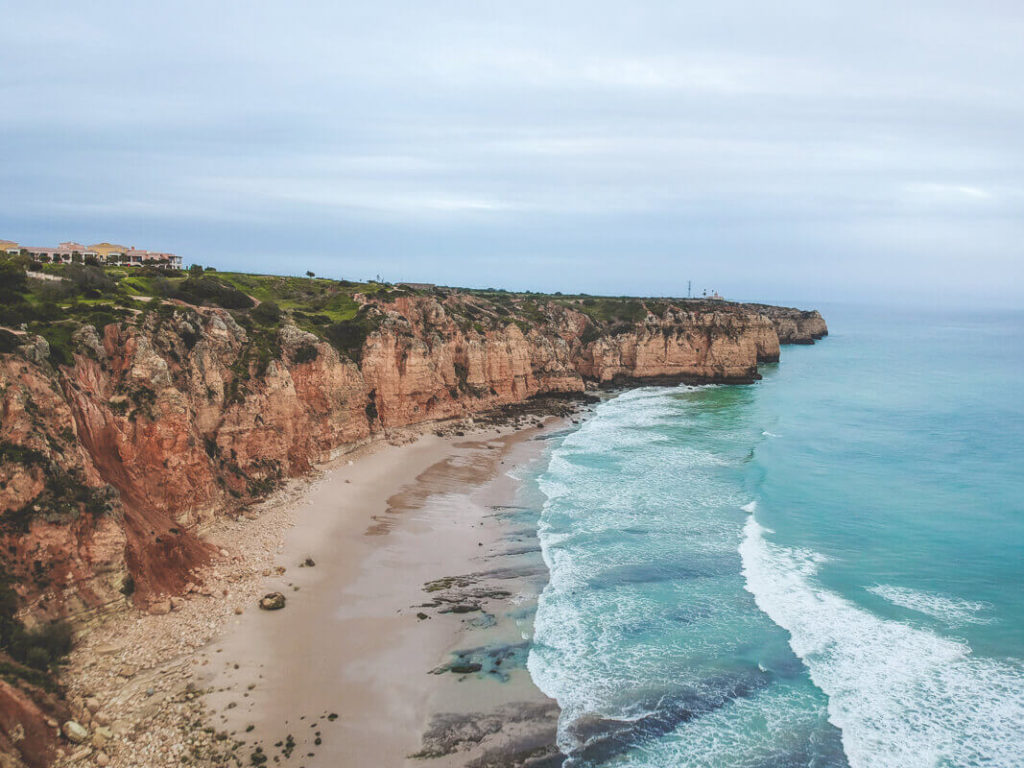
But back to your camper. Remember that you may have to pay tolls on your journey in France, Spain, and Portugal. You will also need third-party vehicle insurance. The “Green Insurance Card” serves as proof of insurance and contains all the important information. From Berlin to Lisbon, for example, it’s about 2,800 km. Your camper should not be falling apart and should still be in good condition. You can also reach the police and fire department in Portugal by calling 112.
Driving in Portugal
Driving in Portugal isn’t really a big problem. There are very good roads and there are worse roads. It all depends on which part of the country you’re traveling in. Potholes, bumps, tears, or very rough road surfaces are not uncommon. In the interior of the Alentejo, for example, the roads are not well-developed. On country roads (M + CM), you get lucky and sometimes unlucky. The motorways (A), on the other hand, are in top condition and usually not very busy, even if they are toll roads.
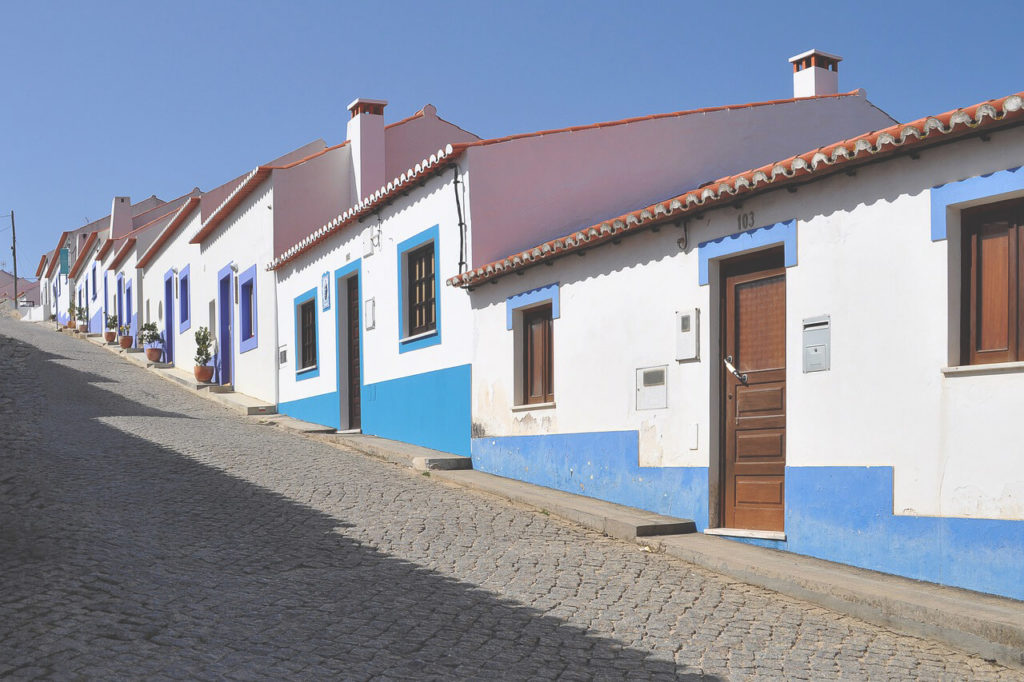
On secondary roads to the most beautiful places
The federal highways (IC + N) are usually in very good condition. Only occasionally it can get surprisingly bumpy. On the coast and in the Alentejo, there are definitely some sections that are not well-developed at all. Unpaved roads can also be found throughout the country. You are allowed to drive on these dirt roads/sand tracks as long as there are no signs stating otherwise. The access roads to beach parking lots or reservoir shores, in particular, are often unpaved.
But as the saying goes in Portugal: “The harder the approach, the better the arrival.”
In Portugal, there are the following speed limits: On motorways, you are allowed to drive 120 km/h, and for motorhomes over 3.5t, 110 km/h. On country roads, 90 km/h is permitted, and for motorhomes over 3.5t, 80 km/h. In built-up areas in Portugal, 50 km/h is permitted, regardless of whether you are driving a car, camper, or a large motorhome. However, many do not adhere to these rules. But you should Don’t let this bother you. In urban areas, speeds are often regulated by braking hills, which are sometimes difficult to recognize.
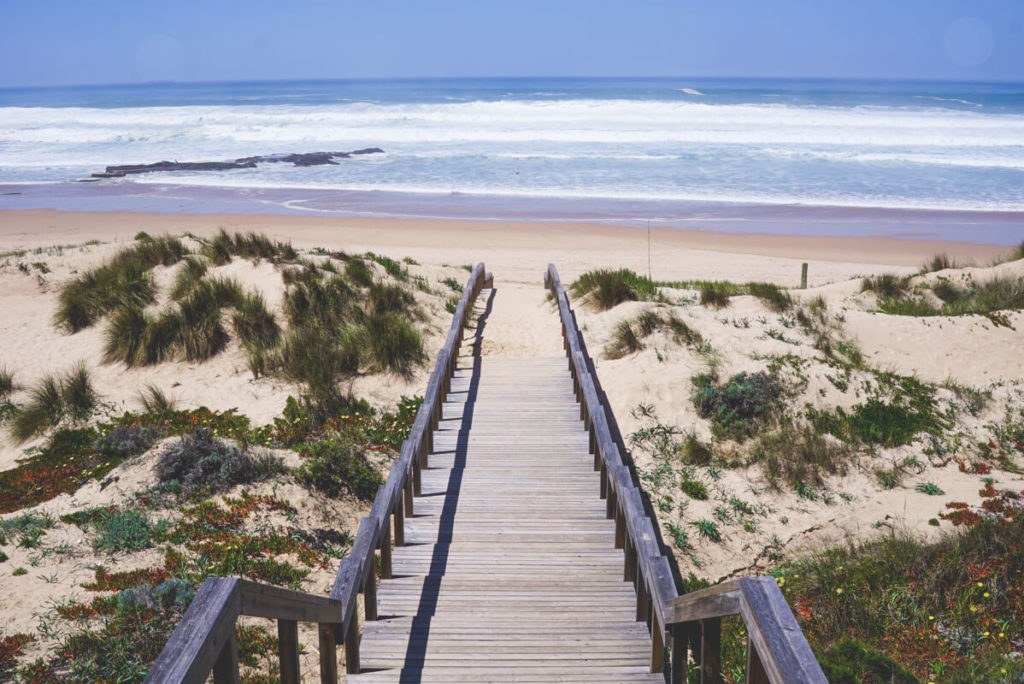
Another tip: When you see the brown signs along the road, look closely. There are always a few highlights to discover here. Signs with binoculars on them (Miradouro) often lead you to beautiful viewpoints. Sometimes a historical site with stones or a castle (Castelo) is depicted. Waves, and thus beaches, are marked with “Barragem.”
Toll Roads in Portugal
In Portugal, most motorways (A) are toll roads. If you want to save money, you have to Use the main and secondary roads. You’ll usually have to allow considerably more time for this. Nevertheless, these secondary roads are particularly pleasing to the eye, as they are either built by the sea or alongside the highways. The N120 towards the southern west coast and the Algarve, for example, is very beautiful.
You can usually pay at toll stations by card or at the counter. For example, we paid around €17 by car from Lisbon to Faro. Motorhomes would have had to pay €30 at this point. Electronic tolls are usually collected in the Algarve, so you can’t pay in cash. You can recognize these stations by the blue “electronic toll only” sign. You can find an overview of toll costs for various routes here: Bussgeldkatalog.org.
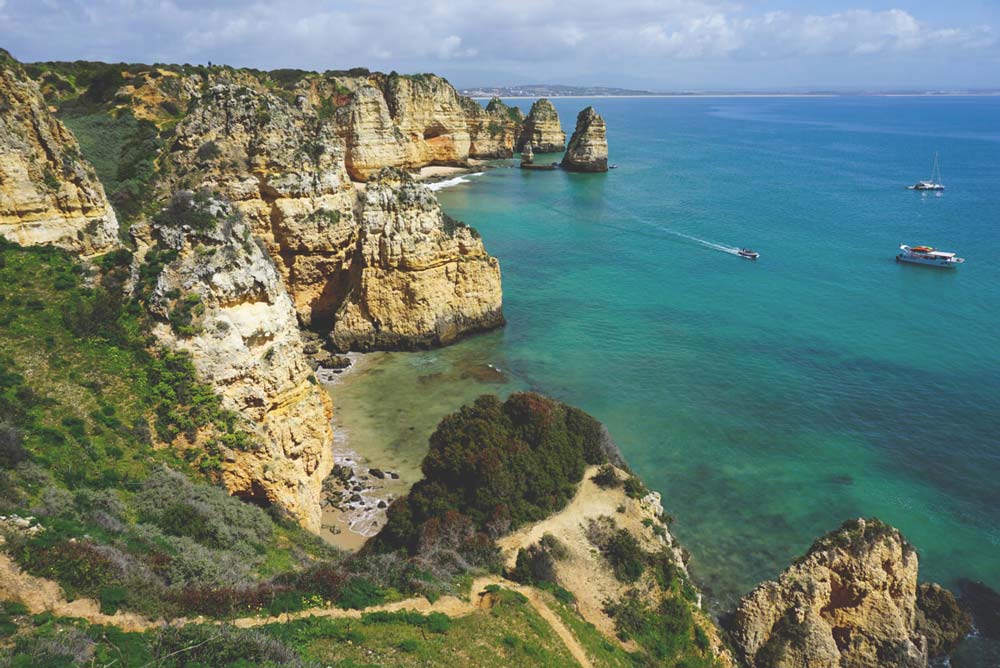
Easy Toll and Toll Card
Alternatively, you can pay via “easy toll.” To do so, you must first register your credit card at a registration office. There, your license plate number will be linked to your credit card. All toll fees incurred will then be debited from your card. However, it is better to register your vehicle beforehand and obtain a prepaid credit (toll card). You can top this up online or at CTT (post office) branches.
A final option is the Via Verde Visitor Transmitter. You attach this to the front of your vehicle and it is particularly suitable for longer trips through Portugal. You can rent the transmitter for around €6 per week (only €1.50 from the second week onwards). A fee of €27.50 applies when renting. You can get the transmitter at post offices, at motorway service stations, Via Verde outlets or online. To do so, use the Via Verde lane, which is marked with a white “V.”
You can find more information on tolls in our article: Portugal Road Trip and on the page with the catalog of fines.
Parking in Portugal
Parking in Portugal is usually subject to a fee. You can get parking tickets from the relevant machines. Prices range from €0.50 to €1.50 per hour, depending on the zone. You can recognize parking and stopping restrictions by the yellow roadside. Illegally parked vehicles are often towed away or fitted with wheel clamps. Fines range from €40 to €200.
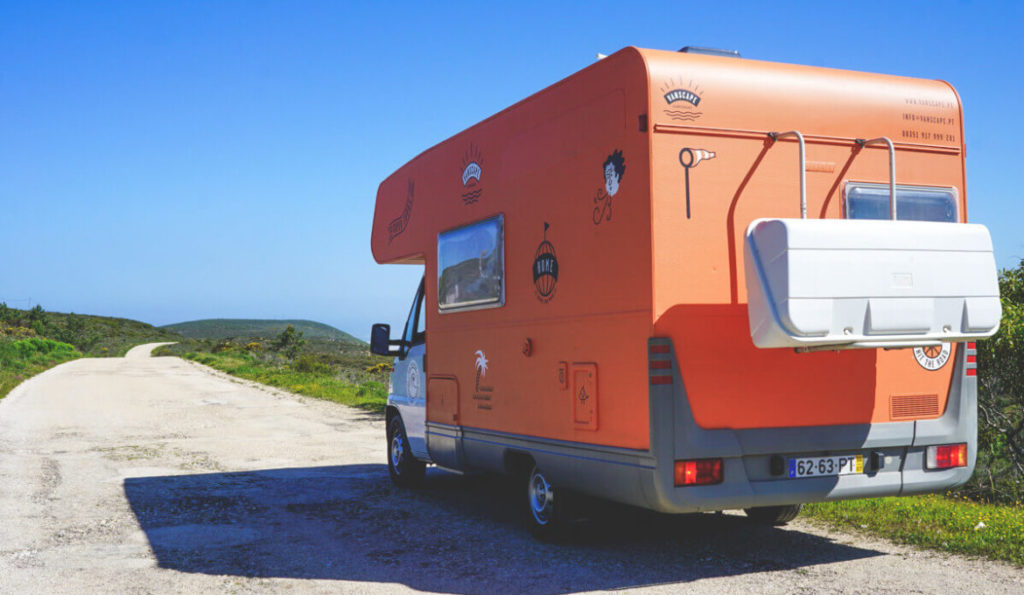
Finding a parking space is particularly difficult in small villages. Vehicles squeeze along the already narrow roads. You can get through easily with a rental car, but it’s more difficult with larger vehicles. You can also find parking spaces in front of shopping centers, supermarkets, and on beaches.
Fueling and Gas Prices
It’s best to fill up when you pass a cheap gas station. Diesel is relatively expensive compared to Spain. Gas stations along highways are usually open 24/7. Otherwise, typical opening hours are from 6/7 a.m. to 9/11 p.m. It’s usually cheaper at the gas stations of the Jumbo and Intermarché supermarkets.
Shopping and Supplies
Shopping in Portugal is just as easy as in Germany. You’ll find the supermarket chains LIDL, Aldi, Intermaché, Continente, SPAR, Coviran, and others. There, you can get just about anything your heart desires. Prices are similar to those in Germany. Some products are more expensive, others cheaper. We prefer to go to Intermachés or Lidl. At Intermaché stores, you’ll often also find washing machines and dryers. Here, you can wash and dry your laundry for around €6. You can also usually empty and refill your wastewater tank there.
Conclusion: Camping in Portugal
Camping in Portugal is simply fantastic. The country offers so many beautiful spots, beaches, bays, villages, towns, and much, much more. It’s also geared toward camping tourism, making traveling very comfortable and easy. You’ll always find a campsite, a gas station, and a supermarket. Prices are comparable to those in Germany, but you can occasionally find a few bargains.
If you’re looking for adventure, beautiful natural scenery, and a pleasant, mild climate, then Portugal is the right place for you. The country is simply fun and is especially popular with surfers. You’ll find waves here all year round. We love Portugal and will be back soon. This time with a camper and absolute freedom.
Book tours in Portugal
You can take various tours in Portugal or explore the surrounding area. Get your Guide offers a wide selection of excursions and tours. How about a tour of the Benagil Cave, a food tour through Lisbon, or a wine tasting in Porto?